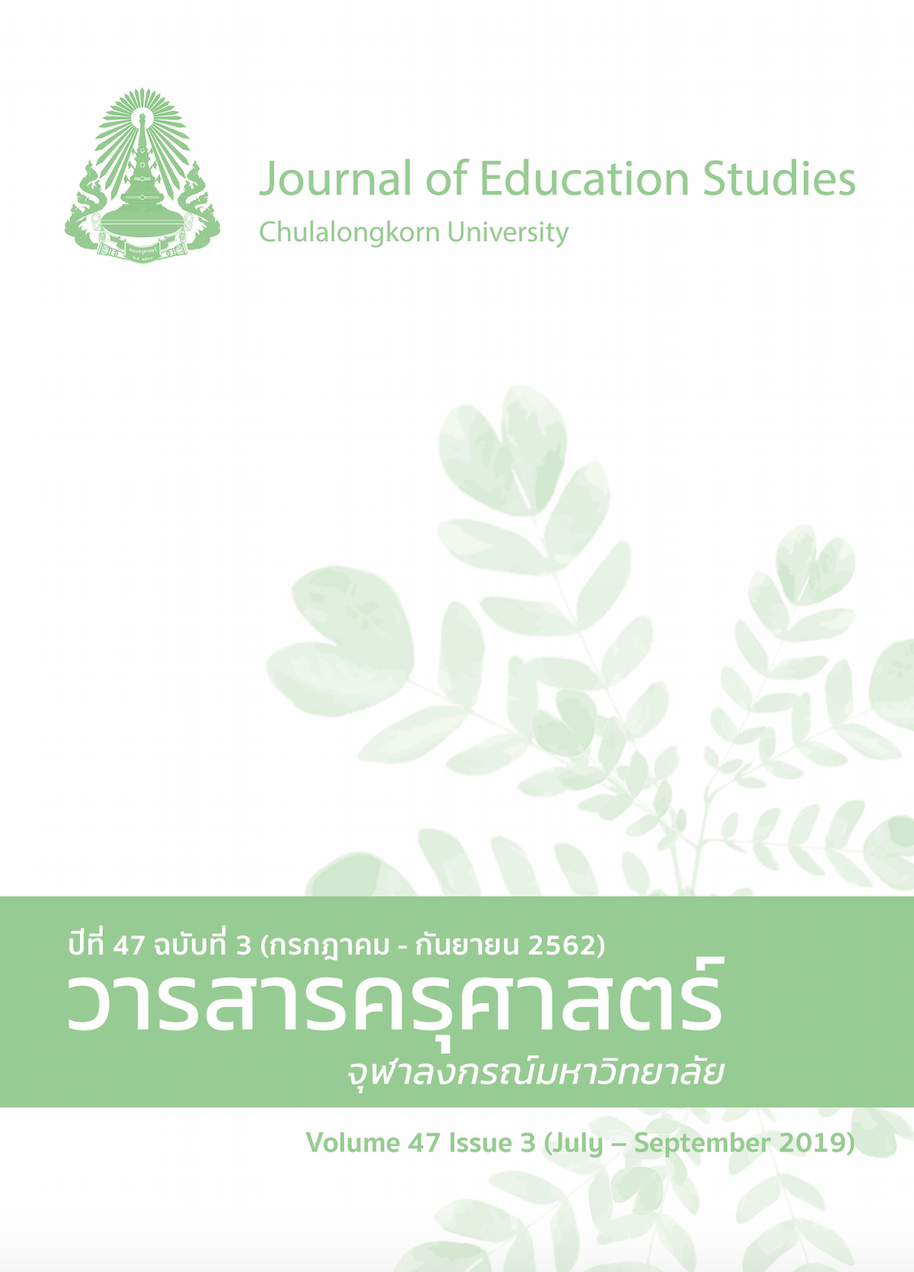Development of an Instructional Model Based on Inquiry-Based Learning and 360 Degree Feedback Approaches to Enhance English Argumentative Writing Ability of Undergraduate Students
Keywords:
INSTRUCTIONAL MODEL DEVELOPMENT, INQUIRY BASED-LEARNING APPROACH, 360 DEGREE FEEDBACK APPROACH, ENGLISH ARGUMENTATIVE WRITING ABILITYAbstract
The purpose of this study was to develop and study the effectiveness of an instructional model based on inquiry-based learning and 360 degree feedback approaches to enhance the English argumentative writing ability of undergraduate students. The sample was 36 sophomore English major students of Rajamangala University of Technology Phra Nakhon. The data collection instruments were the argumentative writing ability tests. Data were analyzed by the arithmetic mean, standard deviation, and t-test.
The findings of this study revealed that 1) the instructional model based on inquiry-based learning and 360 degree feedback approaches consisted of 4 steps: 1.1 stimulating curiosity, 1.2 making a plan to create new knowledge, 1.3 creating a new task, and 1.4 enhancing learning through reflection. 2) The results of the effectiveness of implementing the developed instructional model demonstrated that: 2.1) The experimental group’s English argumentative writing ability was higher after studying with the developed instructional model at the .05 level of significance; and 2.2) the experimental group and control group had no significant difference in English argumentative writing ability at the level of .05.
References
Bijami, M., Kashef, S. H., & Nejad, M. S. (2013). Peer feedback in learning English writing: Advantages and disadvantages. Journal of Studies in Education, 3(4), 91-97.
Boonpattanaporn, P. (2007). A comparative study of English essay writing strategies and difficulties as perceived by English major students: A case study of school of humanities (Research Report). Bangkok: University of the Thai Chamber of Commerce.
Bruner, J. S. (1966). Toward a theory of instruction. Cambridge: Harvard University Press.
Chantraukrit, P. (2013). Development of an instructional model by Integrating the argument-driven inquiry model and model-based learning approach to promote scientific literacy competencies and rationality of lower secondary school students (Unpublished Doctoral Dissertation). Chulalongkorn University, Bangkok.
Dalai, S. (2008). Effects of developing concept by using inquiry process on mathematics on learning achievement and reasoning ability of seventh grade students (Unpublished Master's Thesis). Chulalongkorn University, Bangkok.
Education Development Center. (2006). Inquiry-based learning: An approach to educating and inspiring kids. Boston: Education Development Center.
Hillocks, J. (2010). Teaching argument for critical thinking and writing: An introduction. English Journal, 99(6), 24-32.
Hyland, K. (2003). Second language writing. New York: Cambridge University Press.
Jantasin, P. (2015). Effect of writing instruction based on toulmin model in flipped learning environment on argumentative writing ability of undergraduate students (Unpublished Master's Thesis). Chulalongkorn University, Bangkok.
Ka-kan-dee, M., & Kaur, S. (2015). Teaching strategies used by Thai EFL lecturers to teach argumentative writing. Procedia-Social and Behavioral Sciences, 208, 143-156. Retrieved from https://www.sciencedirect.com/science/article/pii/S1877042815055317?via%3Dihub
Keh, C. L. (1990). Feedback in the writing process: A model and methods for implementation. Hong Kong: Oxford University Press.
Krieger-James, T. (2012). Argumentative writing rubric based on Toulmin model. Retrieved from https://www.uen.org/lessonplan/view/31420
Leibowitz, B. (2016). Postgraduate students’ perceptions of the 360-degree approach to feedback. Southern African Linguistics and Applied Language Studies, 34(1), 81-92.
Lestari, M. P. (2010). Improving students’ writing ability by using inquiry based learning (Unpublished Undergraduate's Thesis). Sebelas Maret University, Central Java.
London, M. (2003). Job feedback: Giving, seeking, and using feedback for performance improvement. New Jersey: Lawrence Erlbaum Associates.
Mangelsdorf, K. (1992). Peer reviews in the ESL composition classroom: What do the students think? ELT Journal, 46(3), 274-284.
Meiland, J. W. (1981). College thinking: How to get the best out of college. New York: A Mentor Book.
Neuby, B. (2010). Inquiry teaching in the college classroom. Journal of Effective Teaching, 10(1), 4-21.
Oregon Department of Education. (2016). Revised writing scoring guide informative / explanatory and agumentative writing and research projects. Oregon Department of Education.
Phiromrat, S. (2012). Effects of using think-talk-write technique in organizing mathematics learning activities based on inquiry model on mathematical reasoning and communication abilities (Unpublished Master's Thesis). Chulalongkorn University, Bangkok.
Prince, M. J., & Felder, R. M. (2006). Inductive teaching and learning methods: Definitions, comparisons, and research bases. Journal of Engineering Education, 95(2), 123-138.
Ramkaew, S. (2009). Effects of organizing mathematics learning activities using guided inquiry on mathematical concepts and reasoning ability of eighth grade students (Unpublished Master's Thesis). Chulalongkorn University, Bangkok.
Roskams, T. (1999). Chinese EFL students' attitudes to peer feedback and peer assessment in an extended pairwork setting. RELC Journal, 30(1), 79-123.
Sunarni, S. (2012). The application of inquiry method to improve students’ writing skills of second grade of SMK Muhammadiyah Salatiga in the academic year 2012 (Research Report). Semarang: State Institute for Islamic Studies.
Tee, D. D., & Ahmed, P. K. (2014). 360 degree feedback: An integrative framework for learning and assessment. Teaching in Higher Education, 19(6), 579-591.
Vygotsky, L. S. (1978). Mind in society. Cambridge, MA: Harvard University Press.
Zhu, W. (2001). Performing argumentative writing in English: Difficulties, processes, and strategies. TESL Canada Journal, 19(1), 34-50.




